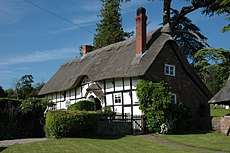cottage
English
Etymology
Anglo-Norman, from Old Northern French cot, cote (“hut, cottage”) + -age (“surrounding property”). Old Northern French cote probably from Old Norse kot (“hut”), cognate of Old English cot of same Proto-Germanic origin.
Slang sense “public toilet“ from 19th century, due to resemblance.
Pronunciation

A thatched cottage in Herefordshire, United Kingdom.

A public toilet in London, United Kingdom.
- (General American)
- IPA(key): /ˈkɑtɪdʒ/, [ˈkɑɾɪdʒ]
- (weak vowel merger) IPA(key): /ˈkɑtədʒ/, [ˈkɑɾədʒ]
- (Received Pronunciation) IPA(key): /ˈkɒtɪdʒ/
Audio (US) (file) - Hyphenation: cot‧tage
Noun
cottage (plural cottages)
- A small house; a cot; a hut.
- A seasonal home of any size or stature. A recreational home or a home in a remote location.
- 1913, Joseph C. Lincoln, chapter 1, in Mr. Pratt's Patients:
- Thinks I to myself, “Sol, you're run off your course again. This is a rich man's summer ‘cottage’ and if you don't look out there's likely to be some nice, lively dog taking an interest in your underpinning.”
- Most cottages in the area were larger and more elaborate than my home.
-
- (Britain, slang, archaic) A public lavatory
- (Polari) as a meeting place for homosexual men.
Synonyms
- (public toilet as a gay meeting place): gingerbread office; tea room, tearoom, teahouse, tea house (US); see also Thesaurus:bathroom.
Translations
A small house; a cot; a hut
|
|
Portuguese
This article is issued from
Wiktionary.
The text is licensed under Creative
Commons - Attribution - Sharealike.
Additional terms may apply for the media files.